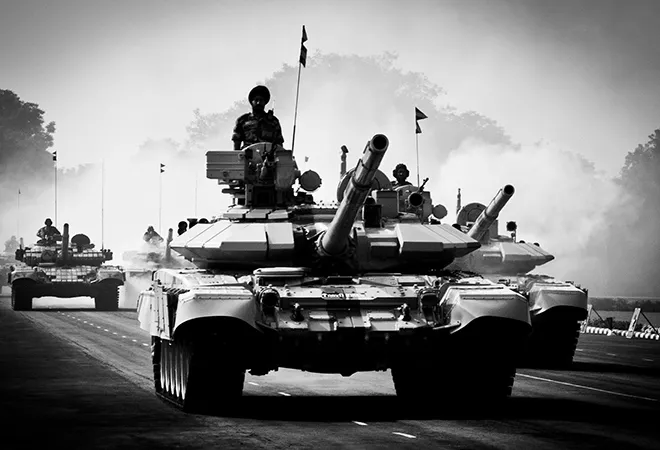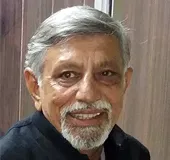-
CENTRES
Progammes & Centres
Location

The LoC is on the boil. India is retaliating to Pakistan firing, but, despite causing disproportionate casualties, it also loses valuable lives of soldiers. Fedayeen attacks hit army bases resulting in casualties. Pathankot was followed by Uri and now Sanjuwan. Over the years, Pakistan has been retaining the initiative and choosing the areas for infiltration, violation of ceasefire and locations for their fedayeen to strike.
India has been hitting back, but attacks from Pakistan have not reduced. While we launch surgical strikes and cross-border operations employing our soldiers, always concerned about the mission failing and resultant casualties, Pakistan employs cannon fodder militants, with minimum training, without concern or even worried about their survival. They even refuse to accept their bodies, thus wiping their hands clean. They have no qualms for losses, while India has.
For years, India even avoided talking about any cross-border operations it launched, until the present government decided to spread the word.
Pakistan has never hidden the fact that it supports secessionist movements in Kashmir, backs the Hurriyat and openly enables Hafiz Saeed and other designated terrorists from collecting funds. It may internationally deny supporting terror groups, but even in the face of damning evidence, it continues. Militants infiltrating across the LoC cannot be coming from Mars -- they are clearly Pakistani’s and even carry Pak products with them.
Indian politicians, including the maverick Mani Shankar Aiyar and those from the valley, continuously request the government to open dialogue with Pakistan. Every government in India has attempted the process soon after assuming power, only to be hit by either a wave of terror strikes or an incident like Kargil. The Pakistan army, which controls the state, decides foreign policy towards India, and has no desire for initiating dialogue with India. While the two National Security Advisers (NSAs) remain in constant touch, nothing changes.
Post the Sanjuwan strike, the Defence Minister Nirmala Sitharaman released funds for the improvement of security infrastructure in military cantonments close to the IB and LoC. Thus, India has begun protecting its bases from militant strikes, more a defensive approach than offensive.
Indian forces have been compelled to change tactics from launching conventional operations to counter insurgency. Thus, our priorities shift from threatening and dominating Pakistan to ensuring our own security, denying Pak trained militants from crossing into India and eliminating them.
Rarely have we considered viable alternatives to compel Pakistan to stop their activities. Our retaliation has remained the Pakistan army. Pakistan on the other hand targets innocent army families, knowing it would hurt the soldier as also villages along the LoC. The army is aware that the more militants it kills, more would attempt to cross -- a never-ending cycle of violence in the valley, now extending south into the Jammu belt.
The nation stands by and supports the army as it goes about its task of ensuring national security and eliminating militancy, seeking to bring succour to the valley. It sheds tears whenever there are casualties and feels the pain of the families of those who sacrificed their lives. On the other hand, families of Pak militants may never be aware of their sons and brothers who have been killed in India and buried in anonymity.
Pakistan employs cheaply available militants to bleed India, to divert its attention from other spheres of development and concentrate on eliminating their cannon fodder. The army, which should be exerting pressure on Pakistan, is compelled to adopt a defensive stance solely to protect itself from militant attacks. Formations in Jammu and Kashmir, who should be deployed for offensive tasks against Pakistan, are busy eliminating militants.
While we gloated over the surgical strikes, they had no major impact. Pakistan denied the same, hid their losses and went ahead as before. Hitting their defences and targeting their army have again failed to produce any result. We have been retaliating, causing more casualties, which their nation has never even known, as it remains subdued by their media. In each case, we employ our trained soldiers, while they launch militants, who have been brainwashed to die, which has never impacted them.
The nation desires answers. Words of condolences, criticism of Pakistan’s actions and promising to make them pay are heard from the political leadership every time there is an incident. These now sound hollow. The army does its job, but would only small border strikes work, or should the government do more? Does the government have a strategy for dealing with Pakistan or is it moving in the dark, searching a wayout? Is adopting the defensive approach the answer or should we seek to make Pakistan bleed?
If despite all our diplomatic pressures, Pakistan has remained on the offensive, then diplomacy has been ineffective. Moving closer to the US has also not paid any dividends, as Washington remains more concerned about Afghanistan than Kashmir. Increasing distance with China has only emboldened Pakistan to enhance its operations. Diplomatic isolation, including enhancing our proximity with traditional Pakistan supporters, West Asian nations, have not increased any pressure on them.
While war is always an instrument of last resort, there could be other options. This would depend on how government perceives it could pressurise Pakistan. If militarily, then it could imply increasing the tempo of firing along the entire front, moving in offensive forces close to the LoC, imposing caution on Pakistan. The army is ready to escalate as it has the resources. If diplomatically, then it needs to devise ways to enhance the pressure on Islamabad, including blocking loans and grants to the nation. If economically, then it needs to push Pakistan into an arms race, which it can ill afford.
The government think tanks and the National Security Council need to develop strategies and adopt what could finally work. It has been decades and all that the nation has heard from the politicians has been criticism and promises. The army has performed all its assigned tasks to the best of its abilities. It is time that there is a comprehensive strategy devised to counter Pakistan’s design or else the nation would continue reacting to their offensive designs.
The views expressed above belong to the author(s). ORF research and analyses now available on Telegram! Click here to access our curated content — blogs, longforms and interviews.

An alumnus of the National Defence Academy Major General Harsha Kakar is a graduate of the DSSC LDMC and the National Securities Studies Course at ...
Read More +